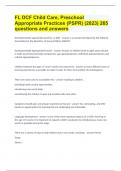FL DCF Child Care, Preschool
Appropriate Practices (PSPR) (2023) 265
questions and answers
Developmentally appropriate practice, or DAP, - answer is a concept developed by the National
Association for the Education of Young Children (NAEYC).
Developmentally Appropriate Practice - answer focuses on children birth to eight years old and
is made up of three principle components: age appropriateness, individual appropriateness and
cultural appropriateness.
Children between the ages of 3 and 5 need to be exposed to - answer as many different types of
learning experiences as possible to make it easier for them to transition into kindergarten.
There are many ways to accomplish this; - answer reading to children,
providing hands-on play opportunities,
introducing new words daily,
and allowing the children to play and socialize with each other.
Caregivers should plan and prepare experiences that are - answer fun, stimulating, and offer
hands-on opportunities for learning that are challenging and achievable.
Language development - answer is one of the most important aspects of a child's learning at
this age (3-5 years). It is important to expand a child's vocabulary by introducing as many new
words as possible during this stage.
There are a variety of ways to help children learn new words, including: - answer Poems
Songs
Stories
,Parental Involvement
True or False?
Onomatopoeia means words that describe smells. - answer False
Onomatopoeia are words that make sounds like "Pop," "Bang," "Plunk" and "Snap."
True or False?
Children between the ages of 3 and 5 need to be exposed to as many different types of learning
experiences as possible to make it easier for them to transition into kindergarten. - answer True
True or False?
To increase a child's vocabulary, parents should be encouraged to read to their child daily. -
answer True
True or False?
Developmentally Appropriate Practice is made up of three principles: age appropriateness,
individual appropriateness, and cultural appropriateness. - answer True
True or False?
Language development is one of the key aspects of a child's learning at ages 6 and 7. - answer
False
Language development is one of the most important aspects of a child's learning during the
ages of 3-5 years.
True or False?
Children's songs are entertaining but do not serve any educational purpose. - answer False
Music has a general appeal to children of all ages and also features rhyming and repetition of
words. Helping children learn the words to age appropriate music is a great way to ensure that
they will absorb and retain new words.
,True or False?
Poems, songs, stories, and parental involvement are all good ways of helping language develop
for children. - answer True
True or False?
Songs like 'Old Macdonald' are important because they introduce children to new animals and
the sounds they make. - answer True
True or False?
Onomatopoeia means words that describe sounds. - answer True
Onomatopoeia are words that make sounds like "Pop," "Bang," "Plunk" and "Snap."
True or False?
Poems are a good way to introduce new words to children because they are short and feature
rhyming and the repetition of words. - answer True
Jean Piaget - - answer Four Stages of Cognitive Development
Erik Erikson - - answer Eight Conflicts of Social and Emotional Development
According to Piaget, the four stages of cognitive development are: - answer Sensorimotor - 0-2
years old
Preoperational - 2-7 years old
Concrete-Operational - 7-11 years old
Formal Operations - 11 years old and older
The Preoperational Stage - answer During this stage, young children learn about their world
through their actions. This is one reason that hands-on learning is crucial during this stage of
, development. As a caregiver, you must provide children with as many opportunities for hands-
on learning as possible.
According to Piaget, the Preoperational stage - answer is from ages 2-7 and is most relevant to
young children. During this stage, young children learn about their world through their actions.
Children at this age (2-7) and stage (Preoperational) - answer -Tend to think illogically, as they
will begin to develop logic in the
next stage, concrete-operational.
-Their thinking process is non-sequential, such as not understanding
that a small puddle was once an ice cube.
-Are egocentric, meaning that they do not perceive the
consequences of their actions upon others.
-They are beginning to understand simple concepts, e.g., to classify
large and small stack-able plastic bowls or to understand the
sequence of their daily schedule.
Piaget's theory explains - answer how children interact with their environment to construct
knowledge.
What are some ways you can implement developmentally appropriate practice to support the
growth of young children during this stage? - answer Provide open-ended, hands-on activities
so children can progress through as they develop transformation
Ask open-ended questions that encourage children to explain their thought process.
Provide a variety of activities that allow children to experience real life events (field trips, guest
speakers, show and tell).
Ask children about their own experience. For example: "Tell us about your painting."
At story time ask the children about their favorite stories, and ask the children what happens in
the stories.




